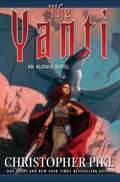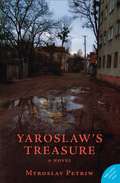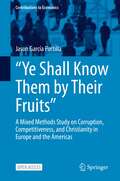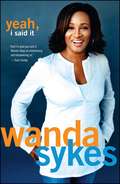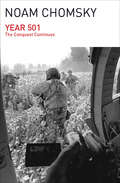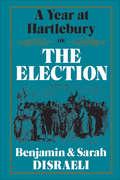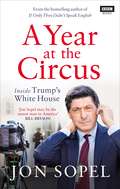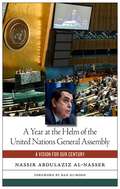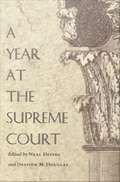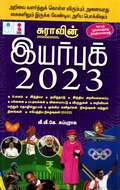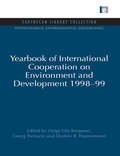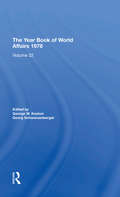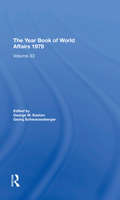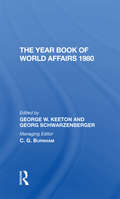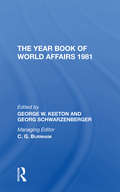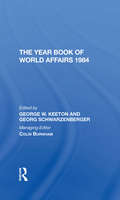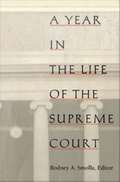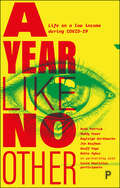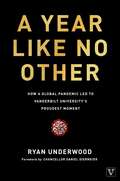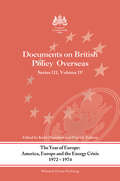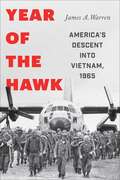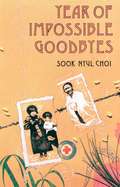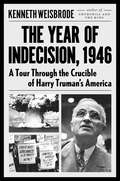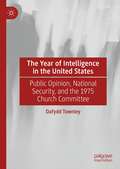- Table View
- List View
The Yanti (Alosha Trilogy #3)
by Christopher PikeInAlosha andThe Shaktra, thirteen-year-old Ali Warner discovered that she was not an ordinary teenager, but was actually Queen of the Fairies. Through seven painful trials, Ali reclaimed many of her magical powers and defeated an elemental army that was preparing to attack the Earth. In the elemental world, Ali learned the true nature of her greatest enemy -- the Shaktra -- and discovered why it covets the Yanti, a mystical talisman of immense power that Ali now possesses. Now, inThe Yanti, Ali discovers that a mysterious Entity is masterminding the Shaktra's attack on Earth, an attack that will kill billions and leave both Earth and the elemental world shattered. Still reeling from the death of one of her closest friends, Ali finds herself accused of murder on Earth and besieged by enemies in the elemental world. The Shaktra has had years to develop her magical abilities and her evil plots, guided by the otherworldly Entity. Ali has only known about her fairy powers for a month. There are holes in her fairy memories and her powers are still incomplete, while the Shaktra commands vast armies of hideous monsters and rules over hosts of dragons. Ali's allies are few: one dragon, one leprechaun, a single troll, a handful of fairies and an African boy, Ra, who has sworn to serve Ali even beyond death. Plus the mysterious disembodied Nemi -- whose love sustains Ali through her darkest moments of despair. Only the Yanti can stop what is to come. Unfortunately, Ali has barely had a chance to study it. The first time she tries to use it as a weapon, it nearly kills her. Unless Ali Warner can solve the riddle of the Yanti - and the mystery behind the Shaktra's insane bitterness -- then the Earth and the elemental world will be doomed.
Yaroslaw's Treasure: A Novel
by Myroslav PetriwWinner of the 2002 Anna Pidruchney Award For New Writers On a visit to Ukraine to retrieve a family heirloom secretly buried by his grandfather during the Second World War, Yaroslaw, a Ukrainian-Canadian university student, stumbles into a world full of spies and secret organizations, peril and political intrigue. His discovery of the hidden cache yields clues to the location of a fabled lost treasure-the greatest in all Europe. Working against time, Yaroslaw and a small band of accomplices struggle to uncover and save a nation’s heritage, operating in secret to prevent the corrupt leaders of the government and the Russians-from stealing it. Yaroslaw’s Treasure is a thrilling suspense story set against the gripping drama of the Orange Revolution, the 2004 popular uprising that saw hundreds of thousands of people take to the streets in Ukraine to overthrow a corrupt government and reinforce democracy in a land long occupied by repressive and foreign regimes. Rich with history, romance, politics, and danger, Yaroslaw’s Treasure superbly captures the wonders and horrors of Ukraine’s past, swirls through the treacherous currents of its present politics, all the while providing entertainment as a first-rate thriller.
Yasir Arafat: A Political Biography
by Barry Rubin Judith Colp RubinYasir Arafat stands as one of the most resilient, recognizable and controversial political figures of modern times. The object of unrelenting suspicion, steady admiration and endless speculation, Arafat has occupied the center stage of Middle East politics for almost four decades. Yasir Arafat is the most comprehensive political biography of this remarkable man. Forged in a tumultuous era of competing traditionalism, radicalism, Arab nationalism, and Islamist forces, the Palestinian movement was almost entirely Arafat's creation, and he became its leader at an early age. Arafat took it through a dizzying series of crises and defeats, often of his own making, yet also ensured that it survived, grew, and gained influence. Disavowing terrorism repeatedly, he also practiced it constantly. Arafat's elusive behavior ensured that radical regimes saw in him a comrade in arms, while moderates backed him as a potential partner in peace. After years of devotion to armed struggle, Arafat made a dramatic agreement with Israel that let him return to his claimed homeland and transformed him into a legitimized ruler. Yet at the moment of decision at the Camp David summit and afterward, when he could have achieved peace and a Palestinian state, he sacrificed the prize he had supposedly sought for the struggle he could not live without. Richly populated with the main events and dominant leaders of the Middle East, this detailed and analytical account by Barry Rubin and Judith Colp Rubin follows Arafat as he moves to Kuwait, Syria, Jordan, Lebanon, Tunisia, and finally to Palestinian-ruled soil. It shows him as he rewrites his origins, experiments with guerrilla war, develops a doctrine of terrorism, fights endless diplomatic battles, and builds a movement, constantly juggling states, factions, and world leaders. Whole generations and a half-dozen U.S. presidents have come and gone over the long course of Arafat's career. But Arafat has outlasted them all, spanning entire eras, with three constants always present: he has always survived, he has constantly seemed imperiled, and he has never achieved his goals. While there has been no substitute for Arafat, the authors conclude, Arafat has been no substitute for a leader who could make peace.
“Ye Shall Know Them by Their Fruits”: A Mixed Methods Study on Corruption, Competitiveness, and Christianity in Europe and the Americas (Contributions to Economics)
by Jason García PortillaWhy are historically Catholic countries and regions generally more corrupt and less competitive than historically Protestant ones? How has institutionalization of religion influenced the prosperity of countries in Europe and the Americas?This open access book addresses these critical questions by elucidating the hegemonic and emancipatory religious factors leading to these dissimilarities between countries. The book features up-to-date mixed methods from interdisciplinary research contributing to existing studies in the sociology of religion field by demonstrating—for the first time—the effect of the mutually reinforcing configuration of multiple prosperity triggers (religion–politics–environment). It demonstrates the differences in the institutionalization of Roman Catholicism and Protestantism by applying quantitative and qualitative methods and by performing a qualitative comparative analysis (QCA) of 65 countries. The author also provides a comprehensive survey and results of empirical research on different theories of development, focusing on the influence of religion.
Yeah, I Said It
by Wanda SykesWanda Sykes reduces people to tears -- tears of laughter. She's done so as a stand-up comic, a sitcom star, and a sports commentator for years now, and in the process she's gained a huge fan base nationwide. Now that she's conquered television, she's applying her genius to her first book, Yeah, I Said It. Here, Wanda presents hilarious and uncensored commentary on sex, family, politics, celebrities, and much more than she could ever say in a sound bite. But then again, she's a genius with a sound bite too. Here's what she says about men and football. "I used to think that football took place in this overbearing male-only environment that bled masculine domination. But the more I attend, the more I realize these football fans could actually be experiencing the straight man's gay pride parade. You see men painting each other's faces in bright colors. You see men proud to wear another man's last name on their shirt. You see some men wear no shirt at all....Hot wieners on every corner as you walk up to the main competition. Men open the back of their trunks for a little tailgating." Here's what she says about women: "Women are taking stripper classes in hopes their men will stop going to strip clubs....You can't compete with those strippers....You gotta have...the stripper mentality. In other words, the ability to lie like a dog for a measly buck. A stripper will tell your man anything for a dollar. 'Oow, I thought you were Brad Pitt.' " An uproarious and irreverent collection from one of today's foremost comedic talents, Yeah, I Said It is Wanda Sykes at her uncensored best. Here, she channels her sharp wit into funny bits on the truth as she sees it from the halls of government in Washington, D.C., to the red carpets and boardrooms of Hollywood. Imbued with her razor-sharp voice, these essays showcase Sykes's sidesplitting candor and her trademark brand of comedy.
Year 501: The Conquest Continues (Chomsky Perspectives Ser. #Vol. 63)
by Noam Chomsky"The great work of subjugation and conquest" has changed little over the years. Analyzing Haiti, Latin America, Cuba, Indonesia, and even packets of the Third World developing in the United States. Noam Chomsky draws parallels between the genocide of colonial times and the murder and exploitation associated with modern-day imperialism.
A Year at Hartlebury, Or, The Election
by Benjamin Disraeli Sarah DisraeliThe revelation that a long forgotten novel first published anonymously in 1834 is the work of Benjamin Disraeli and his sister Sarah is an exciting literary event. Newly discovered letters between brother and sister prove without doubt that it was written jointly by them. We do not have to look far for the reason for their secrecy. The vividly described election which forms the centrepiece of the story is clearly based on Disraeli's recent experiences as an unsuccessful candidate in two elections at High Wycombe. His political career had a long way to go and the last thing he wanted was to jeopardize it by revealing his motives in the past or his hopes for the future. The hero, Aubrey Bohun, has, like Disraeli, recently returned from mysterious travels in the East, but unlike him has his own castle and an income of £30,000 a year. Bohun obviously contains an element of wish fulfilment and allows the authors to incorporate in the novel elements of wish fulfilment and allows the authors to incorporate in the novel elements of a popular genre known in its day as 'silver fork' fiction – revelations of high life. Although there is much of this and of melodrama too, there is also some splendid social irony. Michael Foot says 'the volume is quite fit to takes its place in the true Disraeli canon and contains many gems which add fresh gleams to the portrait of Disraeli himself.' Two appendixes explain the literary detection that proved the book's authorship and the parallels between the politics of Aubrey Bohun and Disraeli.
A Year At The Circus: Inside Trump's White House
by Jon SopelWelcome to the White House.At the heart of Washington, there is a circus. It's raucous, noisy and full of clowns. Reporting on it is a daily cacophony. Four major stories can blow up and blow out before breakfast, and political weather systems are moving at warp speed. The one thing absent from the weather forecast is the tranquil eye of the storm. That we never see. In A Year at the Circus: Inside Trump's White House, BBC North America Editor, Jon Sopel, takes you inside Trump’s West Wing and explores the impact this presidency has had on the most iconic of American institutions. Each chapter starts inside a famous Washington room, uncovering its history and its new resonance in the Trump era. You are invited to step inside the Oval Office where Trump called for loyalty from FBI Director James Comey, and experience life as a reporter in the Briefing Room, where the tense relationship between the media and the President is played out. Guiding you through these rooms, Jon reveals the inner workings of the Trump White House and details the key moments and conversations that have unfolded within its walls.From Kim Jong-un and Kavanaugh to Merkel and the Mueller Inquiry - this is your insider guide to the Washington Circus. Roll up, roll up ...
A Year at the Helm of the United Nations General Assembly: A Vision for our Century
by Nassir Abdulaziz Al-Nasser Ban Ki-MoonFrom September 2011 to September 2012, Ambassador Nasser Abdulaziz Al-Nasser of Qatar presided over the 66th session of the "world's parliament" - the United Nations General Assembly. It was a critical moment in international affairs as the UN responded to a range of global challenges, from the world financial crisis to the Arab Spring. In A Year at the Helm of the General Assembly, Al-Nasser presents a high-level look inside the organization, assessing its strengths and weaknesses, its successes and struggles. He recounts dramatic moments, such as replacing the Libyan delegation, and a tireless schedule of overseas travel, including joint visits with the Secretary-General to Libya and Somalia. His work takes him from major international summits such as the Conference on Sustainable Development in Rio de Janeiro, Brazil (Rio+20) to the European Parliament, which he was the first General Assembly President to address, to academic institutions from Oxford to Moscow to Morocco. Al-Nasser structures the book as he did his 66th session, around four main themes or "pillars:" mediation, UN reform, natural disaster prevention and response, and sustainable development.He offers a wide range of recommendations to intergovernmental institutions, to states, to the public sector, and to individuals. Al-Nasser was determined to leave behind a General Assembly that the people of the world could look up to and depend on. This volume is a testament to all that he accomplished in that regard, and a unique resource for those interested in knowing more about the world's most representative body at a crucial moment in history.
A Year at the Supreme Court
by Neal Devins Davison M. DouglasThe United States Supreme Court's 2002-03 term confounded Court watchers. The same Rehnquist Court that many had seen as solidly conservative and unduly activist--the Court that helped decide the 2000 presidential election and struck down thirty-one federal statutes since 1995--issued a set of surprising, watershed rulings. In a term filled with important and unpredictable decisions, it upheld affirmative action, invalidated a same-sex sodomy statute, and reversed a death sentence due to ineffective assistance of counsel. With essays focused on individual Justices, Court practices, and some of last year's most important rulings, this volume explores the meaning and significance of the Court's 2002-03 term. Seasoned Supreme Court advocates and journalists from The New Republic, The Los Angeles Times, Newsweek, National Journal, Slate, and Legal Times grapple with questions about the Rehnquist Court's identity and the Supreme Court's role in the political life of the country. Some essays consider the role of "swing" Justices Sandra Day O'Connor and Anthony Kennedy within a Court that divides 5-4 more than any other group of Justices in the nation's history. Others examine the political reaction to and legal context of the Court's Lawrence v. Texas decision declaring a Texas law criminalizing homosexual sodomy unconstitutional. Contributors analyze the Court's rulings on affirmative action and reassess its commitment to states' rights. Considering the Court's practices, one advocate explores the use and utility of amicus curiae, or "friend of the court" briefs, while another reflects on indications of an increased openness by the Court to public scrutiny. Two advocates who argued cases before the Court--one related to hate speech and the other to a "three strikes and you're out" criminal statute--offer vivid accounts of their experiences. Intended for general readers, A Year at the Supreme Court is for all those who want to understand the Rehnquist Court and its momentous 2002-03 term. Contributors Erwin Chemerinsky Neal Devins Davison M. Douglas David J. Garrow Dahlia Lithwick Tony Mauro Carter Phillips Ramesh Ponnuru Jeffrey Rosen David G. Savage Rodney A. Smolla Stuart Taylor Jr.
Year Book 2023: ஆண்டு புத்தகம் 2023
by V. V. K. Suburasuஇந்த புத்தகம் போட்டி கொள்ளும் முறைகளுக்கு என்றும் அதிக முக்கியமானது மற்றும் அனைத்து அறிவு விகாரிகளுக்கும் அந்தச் சொற்கள் உள்ளன. குறித்து இந்த புத்தகத்தில் உலகம், இந்தியா, பட்டியல்கள், விளையாட்டுகள் மற்றும் விருதுகளைக் கொண்டு அனைத்து வழிகளும் கொண்டுள்ளது. அதனை கொண்டாட எல்லாருக்கும் இந்த புத்தகம் ஒரு அரிய பருவமாக உள்ளது.
Year Book of International Co-operation on Environment and Development (International Environmental Governance Set)
by Helge Ole Bergesen Georg Parmann Oystein B. ThommessenThis eighth annual edition analyzes the international community's position on specific environment and development problems, the main obstacles to effective international solutions, and how to overcome them. It assesses both the achievements and shortcomings of co-operation, distinguishing between the rhetoric and the reality of environmental world politics.
The Year Book Of World Affairs, 1978
by Georg Schwarzenberger George W. KeetonThis annual survey is devoted to the attitudes of participating States in Europe towards the objective of promoting detente, bringing together references to World affairs examined in the past which have particular relevance.
The Year Book Of World Affairs, 1979
by Georg Schwarzenberger George W. KeetonThis book, under the auspices of the London Institute of World Affairs, aims to provide an independent international forum for the constructive criticism of, and research into, world affairs 1979.
The Year Book Of World Affairs, 1980
by Georg Schwarzenberger George W. KeetonThis year book presents an annual survey to bring together references to themes examined in the past which have particular current relevance. It provides information on international affairs having a stereotyped and repetitive character for anticipating a "new" happening, or "modern" development.
The Year Book Of World Affairs, 1981
by Georg Schwarzenberger George W. KeetonFirst published in 1981. The Council of the London Institute of World Affairs has carefully reconsidered the lessons to be drawn from the Institute's record in its first half-century and reshaped its plans of activities for the 1980s. As in an earlier "cold peace" era, the Council is united in its resolve not to be taken by surprise by any of the contingencies that, on a darkening world scene , must be anticipated in medium-range planning.
The Year Book Of World Affairs 1984
by George W Keeton Georg SchwarzenbergerFirst published in 1984. The final volume. The Council of the London Institute of World Affairs has carefully reconsidered the lessons to be drawn from the Institute's record in its first half-century and reshaped its plans of activities for the 1980s. As in an earlier "cold peace" era, the Council is united in its resolve not to be taken by surprise by any of the contingencies that, on a darkening world scene , must be anticipated in medium-range planning. It is thus only in keeping with comparable action taken in earlier phases of the Institute's existence that the Council has decided to suspend the publication of the Year Book after this Volume .
A Year in the Life of the Supreme Court
by Paul Barrett Richard Carelli Marcia Coyle Lyle Denniston Aaron Epstein Kay Kindred Tony Mauro David Savage Stephen WermielDespite its importance to the life of the nation and all its citizens, the Supreme Court remains a mystery to most Americans, its workings widely felt but rarely seen firsthand. In this book, journalists who cover the Court--acting as the eyes and ears of not just the American people, but the Constitution itself--give us a rare close look into its proceedings, the people behind them, and the complex, often fascinating ways in which justice is ultimately served. Their narratives form an intimate account of a year in the life of the Supreme Court. The cases heard by the Surpreme Court are, first and foremost, disputes involving real people with actual stories. The accidents and twists of circumstance that have brought these people to the last resort of litigation can make for compelling drama. The contributors to this volume bring these dramatic stories to life, using them as a backdrop for the larger issues of law and social policy that constitute the Court's business: abortion, separation of church and state, freedom of speech, the right of privacy, crime, violence, discrimination, and the death penalty. In the course of these narratives, the authors describe the personalities and jurisprudential leanings of the various Justices, explaining how the interplay of these characters and theories about the Constitution interact to influence the Court's decisions. Highly readable and richly informative, this book offers an unusually clear and comprehensive portrait of one of the most influential institutions in modern American life.
A Year Like No Other: Life on a Low Income during COVID-19
by Ruth Patrick Maddy Power Kayleigh Garthwaite Jim Kaufman Geoff Page Katie PybusMoney was already tight for UK families living on a low income before the COVID-19 pandemic, but national lockdowns made life much harder. Telling the stories of these families, this book exposes the ways that pre-existing inequalities, insecurities and hardships were amplified during the pandemic for families who were already in poverty before COVID-19, as well as those pushed into poverty by the economic fallout it created. Drawing on the Covid Realities research programme, and developed in partnership with parents and carers, it explores experiences of home-schooling, social security receipt and government, community and charitable support. This book sets out all that is wrong with the status quo, while also offering a powerful agenda for change. Also see ‘COVID-19 Collaborations: Researching Poverty and Low-Income Family Life during the Pandemic’ (Open Access) to find out more about the challenges of carrying out research during COVID-19.
A Year Like No Other: How a Global Pandemic Led to Vanderbilt University's Proudest Moment
by Ryan UnderwoodThe University that was at the heart of the research to discover the vaccines for the pandemic pens the story of how it all happened.In 2020, as COVID-19 threw the U.S. higher education system into turmoil, university administrators around the country debated whether it was prudent—or even possible—to teach students in person or conduct laboratory research amid a once-in-a-century pandemic. For the leadership at Vanderbilt University, the answer to the question was a resounding Yes. Viewing residential education and collaborative research as essential to its academic and societal mission, Vanderbilt was one of a small number of America&’s top universities to put rigorous safety protocols in place to allow students, faculty, and research personnel back to campus in the fall. Told with recollections and insights from Vanderbilt&’s leaders, students, faculty, and staff, and moving at a pace matching the events it describes, A Year Like No Other takes readers from Vanderbilt&’s near-shutdown in the spring through its reopening for the 2020–2021 academic year, providing an inside look at how the university coped not only with COVID-19, but also with a tragic night of tornadoes and the urgent calls for racial justice following the killing of George Floyd. A Year Like No Other also highlights some of the vital contributions that faculty at Vanderbilt and Vanderbilt University Medical Center have made to the development of COVID-19 vaccines and therapies, with research fueled in part by Dolly Parton, the beloved country music legend. A Year Like No Other captures a singular moment in the university&’s history while delivering a concise portrait of successful crisis management playing out amid the fast-changing circumstances of global health threats and a barrage of local hardships.
The Year of Europe: Documents on British Policy Overseas, Series III Volume IV (Whitehall Histories Ser. #Vol. Iii)
by Keith Hamilton Patrick Salmon Christopher Baxter Alastair NobleThis is the latest volume of Documents on British Policy Overseas and the first in the series to be produced in electronic format, covering the principal themes of: the European Union, transatlantic divisions, war in the Middle East and the diplomacy of the energy crisis. Edited and selected by Foreign and Commonwealth Office historians, it consist
Year Of The Hawk: America's Descent into Vietnam, 1965
by James A. WarrenFrom a celebrated military historian, a powerful account of the most pivotal year of the Vietnam War—the cataclysm that forever changed America.The Vietnam War was the greatest disaster in the history of American foreign policy. The conflict shook the nation to its foundations, exacerbating already deep cleavages in American society, and left the country baffled and ambivalent about its role in the world. Year of the Hawk is a military and political history of the war in Vietnam during 1965—the pivotal first year of the American conflict, when the United States decided to intervene directly with combat units in a struggle between communist and pro-Western forces in South Vietnam that had raged on and off for twenty years. By December 1965, a powerful communist offensive had been turned back, and the US Army had prevailed in one of the most dramatic battles in American military history, but nonetheless there were many signs and portents that US involvement would soon slide toward the tipping point of tragedy. Vividly interweaving events in the US capital with action in Southeast Asia, historian James A. Warren explores the mindsets and strategies of the adversaries and concludes that, in the end, Washington was not so much outfought in Vietnam as outthought by revolutionaries pursuing a brilliant protracted war strategy. Based on new research, Year of the Hawk offers fresh insight into how a nationalist movement led by communists in a small country defeated the most powerful nation on earth.
Year of Impossible Goodbyes
by Sook Nyul ChoiThis autobiographical story tells of ten-year-old Sookan and her family's suffering and humiliation in Korea, first under Japanese rule and after the Russians invade, and of a harrowing escape to South Korea.
The Year of Indecision, 1946
by Kenneth WeisbrodeA vivid account of America at the pivot point of the postwar era, Harry Truman's first full year in office In 1946, America had just exited the biggest war in modern history and was about to enter another of a kind no one had fought before. We think of this moment as the brilliant start of America Triumphant, in world politics and economics. But the reality is murkier: 1946 brought tension between industry and labor, political disunity, bad veteran morale, housing crises, inflation, a Soviet menace--all shadowed by an indecisiveness that would plague decision makers who would waffle between engagement and isolation, as the country itself pivoted between prosperity and retrenchment, through the rest of the century. The Year of Indecision, 1946 overturns the image of Truman as a can-do leader--1946, in fact, marked a nadir in his troubled presidency. Relations broke down with the Soviet Union, and nearly did with the British. The United States suffered shortages and strikes of a magnitude it had not seen in years. In November 1946, the Democrats lost both houses of Congress. The tension between fear and optimism expressed itself too in popular culture. Americans rejoiced in talent and creative energy, but a shift was brewing: Bing Crosby making room for Bill Haley and B.B. King; John Wayne for Montgomery Clift. That year also saw a burst of spirit in literature, music, art and film--beneath the shadow of noir. The issues and tensions we face today echo those of seven decades ago. As we observe in this portrait of the era just before our own, as America learned, piecemeal and reluctantly, to act like a world power, it tried, and succeeded only partially, to master fear. Indecision, Weisbrode argues, is the leitmotif of American history.From the Hardcover edition.
The Year of Intelligence in the United States: Public Opinion, National Security, and the 1975 Church Committee
by Dafydd TownleyThis book will offer a unique approach to the Year of Intelligence, the sixteen-month period between January 1975 and April 1976 that saw the innermost secrets of various US intelligence agencies laid bare before the world. After allegations of intelligence abuses were made in the press, Congress investigated and revealed numerous cases of unwarranted and unconstitutional activity conducted by a number of intelligence agencies. Chief among the investigations was the Senate enquiry, popularly known as the Church Committee after its chairman, Senator Frank Church of Idaho. This study’s objective is to examine the relationship between national security policy and public opinion using extensive archival evidence, including previously unidentified indicators of public opinion. This monograph makes an important contribution to the historiography of the Church Committee, of public opinion, and of national security policy. The research contributes to the debate on the effectiveness of the Church Committee by challenging the conclusions within the established historiography of the limited impact of the committee’s quest for reform. Furthermore, it widens the very limited scholarship that engages with public opinion’s effect on national security policy. And the project also indicates to policymakers the lessons that can be learnt from the case study, principally, that public opinion is a vital ingredient in the decision making process of successful national security policy.
